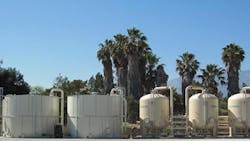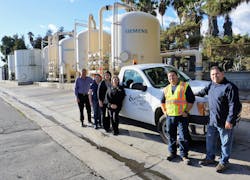California water company shifts TCP cleanup costs to polluters
Sunny Slope Water Company is a mutual water company in Pasadena, Calif., that provides water to a population of more than 25,000 in parts of Arcadia, San Gabriel, San Marino, Temple City, and unincorporated areas of Los Angeles County. It relies entirely on groundwater which is pumped from five wells. Two wells are located in the Raymond Basin and three wells are located in the Main San Gabriel Basin. When Sunny Slope discovered contaminants at dangerous levels in two of its drinking water wells, the mutual water company knew it faced a costly clean-up.
The water company was unable to use either of its Raymond Basin wells after it discovered unacceptable levels of 1,2,3-trichloropropane (TCP) during routine testing. TCP is a toxic and carcinogenic chemical that the state of California bans in drinking water except at very low concentrations. Because TCP has a maximum contaminant level (MCL) of 5 parts per trillion, Sunny Slope was required by law to take action in response to the presence of TCP in its supply.
The detection rendered both of the Raymond Basin wells inoperable, forcing Sunny Slope to rely on its Main San Gabriel Basin wells to offset the reduced production from the Raymond Basin wells. This left Sunny Slope unable to take advantage of its water rights in the Raymond Basin.
But who was responsible? TCP was present as an impurity in products manufactured by Dow Chemical Company and Shell Oil Company. From the 1950s into the 1980s, these products were marketed and sold as pesticides and were used on crops throughout California to control nematodes, microscopic worms that infest the roots of plants. After the products were used as directed, by injection into the soil, the TCP eventually moved into nearby groundwater supplies. California added TCP to its list of cancer-causing agents in 1992, but the State Water Resources Control Board only began regulating the toxin in drinking water in 2017.
Cutting Down Contamination
Ken Tcheng became Sunny Slope’s General Manager in 2008, shortly after the contamination was detected. He faced two significant challenges: finding water sources to meet the demands of the growing population in the mostly residential service area and finding the funds to treat the contaminated wells without passing cleanup costs onto customers.
Sunny Slope determined that the LGAC, despite its more than $2 million price tag, was the best path forward, since it provided a long-term solution to return water quality to acceptable standards.
In 2010, the company secured a $1 million grant from the Upper San Gabriel Municipal Water District to cover half the costs to implement the LGAC system. But the grant covered less than half of the cost of installing the system, which would also cost millions more to maintain and operate over the decades that TCP was expected to remain in the wells.
Tcheng believed strongly that the polluters should bear the responsibility for these remaining costs. But lawyers from an out-of-state law firm, hired by Sunny Slope to work on the case, advised Tcheng that they could not find evidence of the responsible party after working on the case for many years.
Legal Action
So, Tcheng turned to SL Environmental Law Group (SL), a law firm based in California. SL exclusively represents states, municipalities, and water systems facing water contamination issues, helping their clients with identifying the sources of the contamination and holding them responsible. SL worked with Sunny Slope to identify the source of the contamination. Through SL’s careful research, lawyers believed the source of the pollution to have come from the use of the Shell and Dow products at nearby plant nurseries.
“When SL Environmental took on the case we started to see real progress,” Tcheng says. “We are such a small company, so it was very helpful to have SL’s environmental knowledge and leadership. They moved on the case quickly, worked with us, and guided us through the process.”
SL pushed forward with Sunny Slope’s lawsuit against Dow Chemical and Shell Oil, accusing the oil producers of knowingly polluting its groundwater by manufacturing and selling pesticides contaminated with TCP. Further, the lawsuit alleged, the companies failed to take action to remove or substantially reduce the concentrations of TCP in the products, or to provide warnings of the risk that using the products as directed could result in groundwater contamination.
In 2021, Sunny Slope reached a settlement with the companies that were responsible for the contamination. Terms of the settlement were confidential but, Tcheng says, “The settlement allowed the water company to fully recover the cleanup costs and reimburse the Upper District for the grant that helped pay for remediating the Raymond Basin well.”
Water companies like Sunny Slope are increasingly taking polluters to court to recover damages. In California alone, more than 70 communities, utilities, and other water systems have filed lawsuits against Dow, Shell, and other corporations that made or sold pesticides contaminated with TCP. Nearly all of these cases have resulted in settlements to help these systems with the costs of TCP remediation. WW
About the Author
Nancy Mortvedt
Nancy Mortvedt is director of client engagement for SL Environmental Law Group, with prior experience in business development and marketing at the American Water Works Association.

Ken Sansone
Ken Sansone, partner at SL Environmental Law Group, advises cities and local government agencies to identify and hold groundwater polluters accountable. Email him at [email protected].

